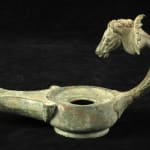Roman Bronze Oil Lamp, 100 CE - 300 CE
Bronze
17.5 x 25.4 cm
6 7/8 x 10 in
6 7/8 x 10 in
LO.1269
This pear-shape oil lamp dates to the Roman era. The arched handle terminates in a horse-head finial emerging from a leafy wreath. The horse’s features are naturalistically rendered with flaring...
This pear-shape oil lamp dates to the Roman era. The arched handle terminates in a horse-head finial emerging from a leafy wreath. The horse’s features are naturalistically rendered with flaring nostrils and the mouth slightly ajar. The facial muscles are well-defined and a thick curly mane runs back along the neck. The body of the lamp is set on a low foot ring with a circular filling hole and an extended nozzle. The majority of oil lamps in the ancient world were made from clay, and only the wealthy could have afforded such a luxurious bronze example. The beauty of the lamp lies in the simplicity of its form, particularly the curve of the handle, and the sensitive treatment of the horse.



